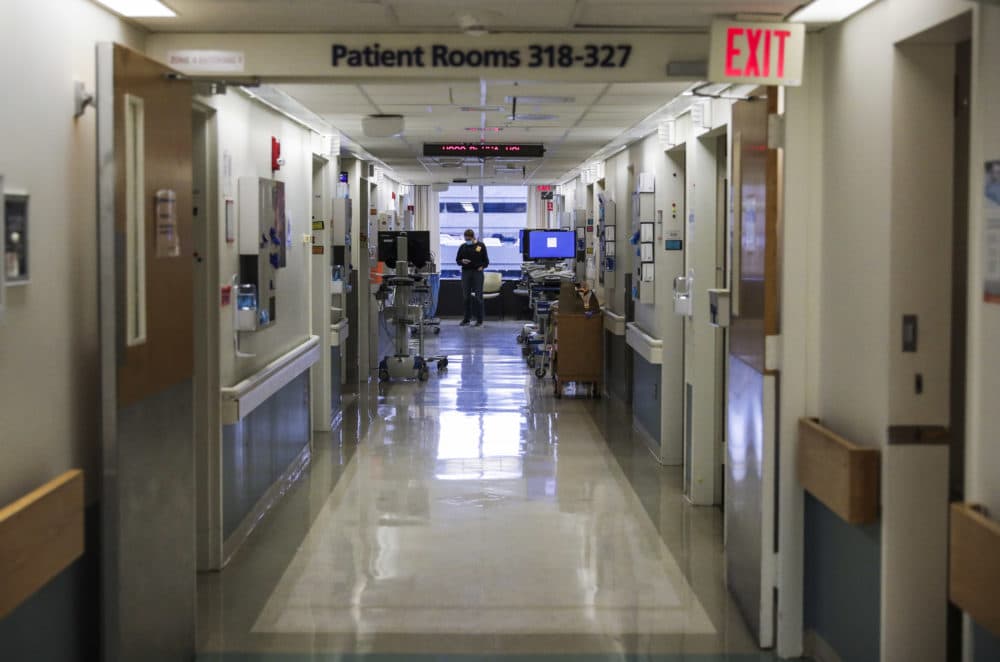Advertisement
Coronavirus Coverage
It's the third winter of COVID. But this one is different

It’s the third winter of COVID.
Cases and hospitalizations are climbing again after the December holidays. Boston-area wastewater data show a steep spike in COVID levels in recent weeks. It's a now familiar pattern.
But this period looks different from the last two pandemic winters. COVID is not the same threat — or the same strain on the health care system — that it once was.
Increasing COVID numbers
Many people traveled or spent more time with friends and family during the December holidays, and Thanksgiving before that, which likely contributed to greater spread of COVID and other respiratory diseases.
But there’s another factor at play. A contagious new COVID strain called XBB.1.5 has been spreading quickly. It accounts for nearly three-quarters of cases in New England, according to the Centers for Disease Control and Prevention.
It’s difficult to know the full extent of this latest COVID upswing because so many people now test at home, and home tests are not reflected in state data.
COVID’s impact on hospitals
COVID hospitalizations in Massachusetts have doubled in the past month to about 1,300. It’s a concerning increase — but still about half of what hospitals experienced around this time last year, when the still-new omicron variant was soaring. (The current strain dominating in the Northeast is a subvariant of omicron.)
Among patients hospitalized now, fewer than 10% are sick enough to need intensive care, a smaller proportion than during past surges.
The share of COVID patients in hospitals who need treatment for the disease also has declined over time. Less than one-third of COVID patients were hospitalized primarily because they're sick with COVID. The others were hospitalized for a different reason and also happened to test positive.
"It is reassuring that even among patients with COVID, they're less sick than patients were overall in the earlier days of the pandemic," said Dr. Shira Doron, hospital epidemiologist at Tufts Medical Center.
Advertisement
COVID is still a concern, and it continues to be deadly in a small minority of patients. But vaccines, tests and treatments have made it a more manageable problem for most patients — and a more routine problem for hospitals.
"COVID has really become just one of the many respiratory viruses that are circulating, and that circulate at higher rates in the winter time," Doron said.
A strained health care system
Still, the health care system is under a lot of stress. The difference now is that COVID is no longer the main stressor — it is one of many.
"The health care system across the state, across the country, remains under extraordinary strain," said Dr. Paul Biddinger, head of emergency preparedness for the Mass General Brigham hospital system. "Our emergency departments are more full than they have been. Our hospitals are more full. The demand for care remains higher than it has been.
"Any increase in the demand for care is really hard to accommodate with the hospital system as strained as it is right now."
Hospital — and especially ICU — capacity is a critical factor in managing the pandemic.
The holiday surge in 2022 was less severe in ICUs than the previous two seasons.
There are several reasons for this level of strain. Patients are coming to emergency departments sicker after deferring care earlier in the pandemic. And they’re staying longer once admitted.
Staffing shortages across health care are contributing to backlogs in care. About 600 people across the state are "boarding," or staying in hospitals while waiting for behavioral health treatment. And up to 1,000 other patients are stuck in hospitals because there is no rehabilitation or skilled nursing bed available for them to continue their care.
A juggling act for hospitals
Hospital leaders said they’re analyzing patient numbers each day and trying to accommodate everyone who needs care. Sometimes, they postpone surgeries to make room for more urgent care, though not at the level they did last winter.
During the pandemic, hospitals have learned to quickly expand capacity when patient numbers rise. They've done this in part by repurposing care spaces.
At UMass Memorial Medical Center in Worcester, some of the rooms typically used during the day for patients recovering from surgery are now used for patients who need to stay overnight.
"This has become the new reality," said Justin Precourt, the hospital’s chief nursing officer. "It's: How do we provide the service that we need to provide to the community within the confines that we have?"
Other viruses of concern
For the first couple years of the pandemic, COVID spread in waves, while other respiratory viruses stayed mostly in the background.
But now, COVID is not the only virus of concern. Flu arrived early and quickly reached levels not seen for the past three seasons.
Another common virus, RSV, surged in October and November. Pediatric hospitals struggled to find beds for all the patients who needed care, including babies and other young children struggling to breathe.
RSV has since receded. And flu appears to have peaked in mid-December, though the prevalence of flu-like illness remains "very high," the highest on a five-point scale, according to data from the state Department of Public Health.
The ongoing spread of these viruses, along with COVID, is continuing to tax the health care system.
"We've been encouraging people to continue to get their boosters," Precourt said, "and really be mindful when out in crowds and with gatherings, just knowing the impact that that all has."
